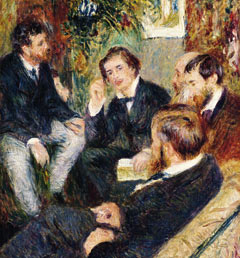(单词翻译:单击)

Old French masters Bridgeman
旧时代的法国大师 Bridgeman
The second golden age of conversation, among the French elites in the late 17th and early 18th centuries, is much better documented. Historians associate the rise of conversation at this time with the prestige enjoyed by women in French high society, which was perhaps unique in Europe before or since. Women ran the salons where the culture of the time was created, and their presence civilised the men they invited there. Another factor was the leisure forced on the French aristocracy by an absolute monarchy. Their political ambitions thwarted, the upper classes turned their energies towards entertaining themselves. A man without conversation was liable to find himself devalued, whatever his other qualities: "In England it was enough that Newton was the greatest mathematician of the century," wrote Jean d'Alembert, a French philosopher and mathematician; "in France he would have been expected to be agreeable too."
谈吐在17世纪晚期至18世纪早期的法国精英之中的第二个黄金时代,则被更好的记录下来。历史学家将这一时期谈吐的兴起与妇女在法国上层社会所享有的特权关联起来,这一点相较于之前或自那时起的欧洲,也许都是独一无二的。妇女奔向那时的文化创造处所——沙龙,而她们的出现让邀请她们的男人们文明起来。另一个因素是,闲适以一种绝对的专制独裁(的面貌)强施于法国的贵族阶层。他们的政治雄心受到阻碍,上层阶层将自身能力转向了自我娱乐。一个不擅言辞的男人,很容易发现自身(掉价了)的贬值,这是不管他自身的其他优点如何的:"英国有了牛顿(Newton)这个国家最伟大的数学家就足够了。" 法国哲学家和数学家达朗贝尔(Jean d'Alembert)写到,"而在法国,对他(牛顿)的期待也是让大家欣然适意的"。
The conversation of the French salons and dinner tables became as stylised as a ballet. The basic skills brought to the table were expected to include politesse (sincere good manners), esprit (wit), galanterie (gallantry), complaisance (obligingness), enjouement (cheerfulness) and flatterie. More specific techniques would be required as the conversation took flight. A comic mood would require displays of raillerie (playful teasing), plaisanterie (joking), bons mots (epigrams), traits and pointes (rhetorical figures involving "subtle, unexpected wit", according to Benedetta Craveri, a historian of the period), and, later, persiflage (mocking under the guise of praising). Even silences had to be finely judged. The Duc de La Rochefoucauld distinguished between an "eloquent" silence, a "mocking" silence and a "respectful" silence. The mastery of such "airs and tones", he said, was "granted to few".
在法国的沙龙的和晚饭桌上的交谈就像芭蕾一样成为一种流行样式。期望能带到餐桌上的基本技能包括:politesse(真诚的好习惯),esprit(机智),galanterie(勇气),complaisance(让人亲近),enjouement(爽朗)和flatterie(殷勤)。随着交谈的腾空而起,就对更为具体的技巧提出了要求。在表现raillerie (戏耍性的揶揄), plaisanterie (开玩笑), bons mots (使用警句), traits and pointes (据这一时期的历史学家Benedetta Craveri,包括"机巧,急智 " 这样的修饰性的特征),以及后来的 persiflage (以称赞的口吻嘲讽)时,就要求有一种滑稽的心境。de La Rochefoucauld公爵就区分了"雄辩"的沉默、"嘲讽"的沉默和"尊敬"的沉默。他说,诸如在"气氛和腔调"这上面的精通是"极少为人所能应允的"。
Conversation was also flourishing across the channel in the early 18th century, but for a different reason. This was the golden age of the British coffee house. Whereas the French salon excluded politics from polite conversation, in the British coffee house politics was a main preoccupation. Foreign visitors remarked both on the free range of speech there and on the mingling of classes and professions. A modern German sociologist, Jürgen Habermas, linked the coffee houses with what he called the "rise of a public space" outside the control of the state, or, as we might say now, civil society.
在18世纪早期,交谈在海峡的对岸同样欣欣向荣,但理由有别。这一时期是英国咖啡屋的黄金时期。法国沙龙把政治排除在文雅的交谈之外。而在英国咖啡屋,政治是主要的(保留节目)预留内容。外国访客不但对那里的言论自由的范围,也对其阶层和专家的之间融合印象深刻。当代德国社会学家尤尔根•哈贝马斯(Jürgen Habermas)将咖啡屋与其所指称的国家控制之外的"公共空间的兴起"相关联,或者,就是我们今天会说的:民间社会。


